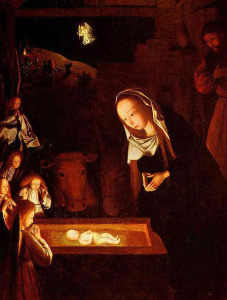My children, like their father many decades ago, have found the animals of our old nativity set particularly fascinating and fun to play with.
And as I have become more convinced that the whole world, the whole universe is loved by God and of eternal concern by God, I have also paid more attention to the location of the birth of Jesus – in a feeding trough in a place where animals were kept and fed.
That Jesus was born in such a place is often used as another illustration of how modestly and humbly God came into this world. There is truth in this.
But there is another way this birthplace was symbolically right. Genesis begins with the Divine, humanity, and the rest of Creation together in harmony and relationship. How appropriate that Jesus’ birthplace would again bring them together as a foreshadowing of the redemption that will be both the end and a second beginning for everything.
I was delighted then to discover the Christmas hymn The Friendly Beasts while skimming through the United Methodist Hymnal in preparation for our family’s Christmas Eve celebration. Here are the lyrics which I’ve pasted into this blog post from a densely informative web site. (Interestingly enough, there are some slight differences between the hymnal’s version and the web site’s.)
THE FRIENDLY BEASTS
Jesus our brother, kind and good/Was humbly born in a stable rude/And the friendly beasts around Him stood,/Jesus our brother, kind and good.
“I,” said the donkey, shaggy and brown,/“I carried His mother up hill and down;/I carried her safely to Bethlehem town.”/“I,” said the donkey, shaggy and brown.
“I,” said the cow all white and red,/“I gave Him my manger for His bed;/I gave him my hay to pillow his head.”/“I,” said the cow all white and red.
“I,” said the sheep with curly horn,/“I gave Him my wool for His blanket warm;/He wore my coat on Christmas morn.”/“I,” said the sheep with curly horn.
“I,” said the dove from the rafters high,/“I cooed Him to sleep so He would not cry;/We cooed him to sleep, my mate and I.”/“I,” said the dove from the rafters high.
Thus every beast by some good spell,/In the stable dark was glad to tell/Of the gift he gave Immanuel,/The gift he gave Immanuel.
“I,” was glad to tell/Of the gift he gave Immanuel,/The gift he gave Immanuel./Jesus our brother, kind and good.
According to the same website, the song is based on a 12th century Latin song Orientis Partibus which was first sung in France. The web site says, “The tune is said to have been part of the Fete de l’Ane (The Donkey’s Festival), which celebrated the flight of the Holy Family into Egypt and was a regular Christmas observance in Beauvais and Sens, France in the 13th century. During the mass, it was common for a donkey to be led or ridden into the church.”
The Latin song quickly found a home in England in the 12th century as well, and so the web site notes that some references will state the song’s origins are English. Early in the 20th century and thanks to the creativity of Robert Davis (1881-1950), the Latin song evolved into an English hymn about the gifts the animals present at the nativity provided to Jesus.
A variety of famous musical artists – Burl Ives, Harry Belafonte, Johnny Cash, Risë Stevens, Peter, Paul and Mary, and Garth Brooks – have recorded this song. You may also know of the hymn by its other names: The Song of the Ass, The Donkey Carol, The Animal Carol, and The Gift of the Animals.
Is the hymn true? It is in its deepest sense. Phrases from other hymns also capture that deeper truth:
In Joy to the World, we sing of earth receiving her king. We also sing of heaven and nature singing.
And the last verse of It Came Upon the Midnight Clear is this:
For lo! the days are hastening on, by prophets seen of old,/When with the ever circling years shall come the time foretold/When peace shall over all the earth its ancient splendors fling,/And the whole world send back the song which now the angels sing.
That truth, that message of good news for the whole world, makes Christmas an especially hopeful time for me. I hope it is for you as well.





